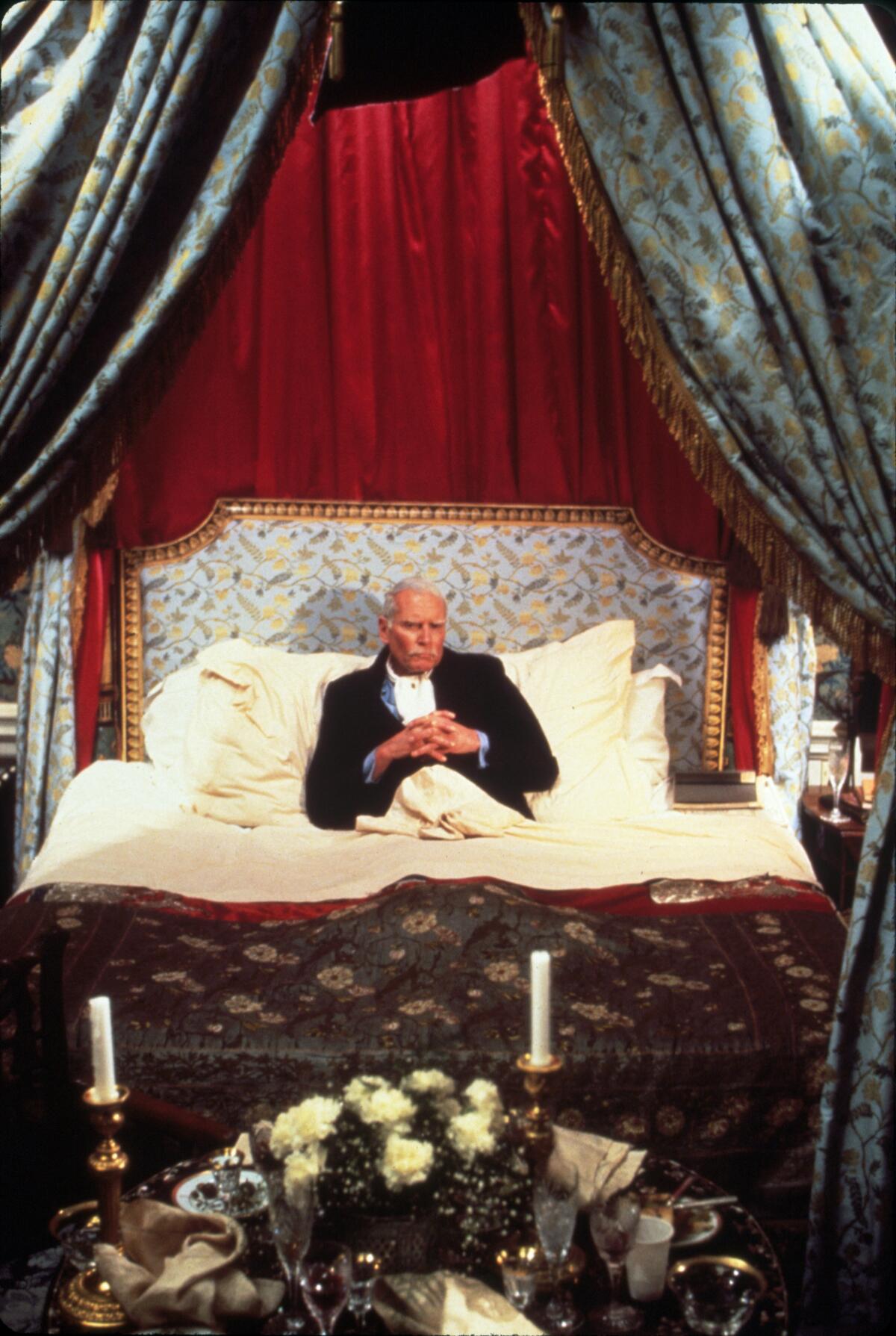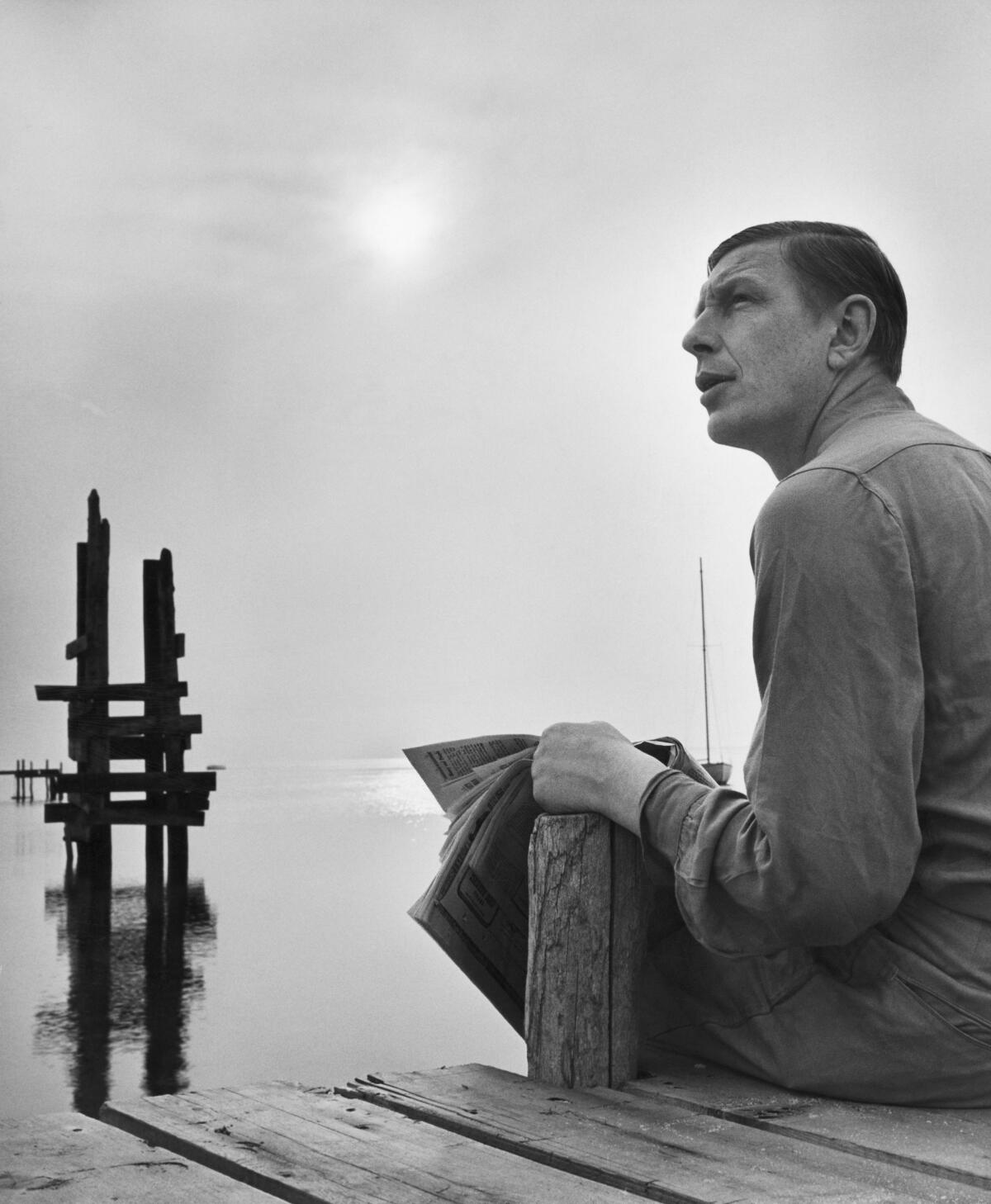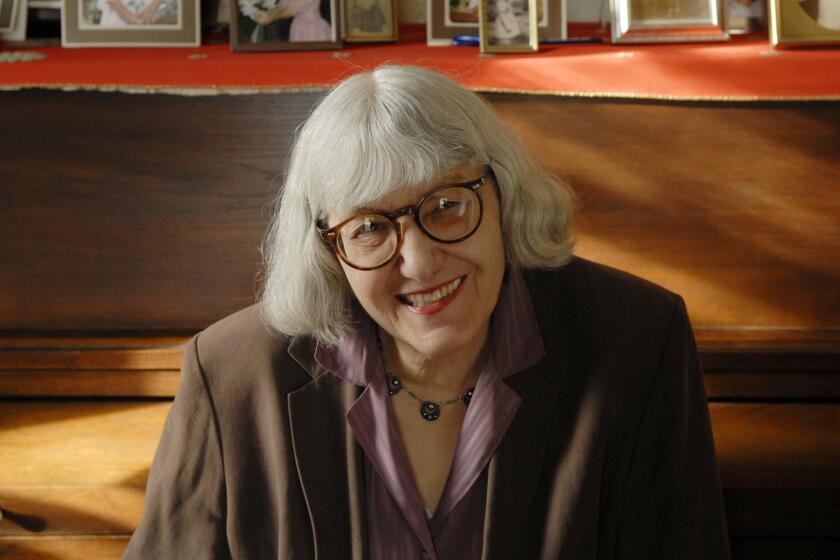Alexander McCall Smith reads up on solitude — and shares a new song — from Scotland quarantine
- Share via
The Times asked authors to track what they do in isolation. Today, the bestselling mystery novelist Alexander McCall Smith writes choral lyrics about his city, Edinburgh, Scotland, watches “Barchester Towers,” listens to Gregorian chants and reads an abbot’s timely advice on “monastic steps for everday life.”
Thursday, 2nd April
Yesterday we received news that we had all been expecting. It was a bit like getting a medical diagnosis that one knows is coming but hopes against hope may be averted. The Edinburgh Festival was cancelled for this year. So, there we are — the largest and one of the longest-running of the world’s arts festivals will not take place this August. And that means all the other festivals that travel on its coattails, including the Edinburgh International Book Festival, are also to be silenced this year.
When the current crisis started, my predominant emotion was sadness. I felt sad that so many lives were to be blighted. I felt sad at the thought of the loneliness that comes from living at a physical distance from others, from just not seeing them except through the lens of a computer’s camera. But now I feel I have passed through that stage. I have started to fill my days with things that in recent years I have been too busy to attend to. I remember how I often thought that it would be good to slow down the world and control the excessive busyness that has been consuming most of us. Well, now it has slowed itself down — with a vengeance. And I must confess that I am savouring that process. I was doing far too much. I was travelling too extensively. I had no time to myself. Suddenly that’s at an end — and I am finding a sense of calm that was not there before. This is the silver lining on an otherwise grim situation.
I have been reading two books that have helped me to deal with this. One is Douwe Draaisma’s “Why Life Speeds Up As You Get Older.” The Dutch psychologist discusses how time feels to us. At the age of ten a week is an eternity; in later life it is nothing. A week today, in seclusion, is being stretched out once more. I feel I have more time. And from another angle altogether, I took down from the shelf a book I had forgotten I possessed: Abbot Christopher Jamison’s “Finding Sanctuary: Monastic Steps for Everyday Life.” The reading of this has been a revelation. It is about inner peace, about stillness. It is just what I need to read now, and I read almost half of it in a single sitting.
Late to bed, well after my wife has retired and switched off her reading light. Edinburgh is quiet. I forget to turn on the burglar alarm, but I imagine the burglars are all observing the Scottish Government’s advice not to leave the house and, if possible, to work at home.
Authors like Lionel Shriver, Alexander McCall Smith, Laura Lippman and Steph Cha are under coronavirus quarantine too. Here’s what they’re reading.
Friday
Last night, at precisely eight o’clock, the clapping started, just as it had the previous Thursday. People stood on their doorsteps, leaned out of their windows, came out on to the street to applaud the health service and the people who work in it. Throughout the United Kingdom, from the smallest village to the largest cities, the whole nation clapped. In our street a piper struck up, the bagpipes providing a spine-tingling background to the moving sound of people expressing their gratitude.

Reading “Finding Sanctuary” sent me off to find suitable music. I have a large CD collection of early English composers — I love the English choral tradition. A friend of mine, Paul Baxter, started the Delphian label, which publishes more recordings of British cathedral choirs than anybody else. I get everything he produces, and so there is a lot from which to choose. Byrd? Tallis? Gibbons? I end up playing Gregorian chant instead — just what I need to encourage the calm I’m trying to cultivate. But the trawl through the collection identifies so much else I shall be listening to.
I enjoy working with composers as a lyricist. Yesterday I completed the words of a song that is being set by Tom Cunningham, a choral composer with whom I have collaborated for some years. The song imagines two people looking down over Princes Street, Edinburgh’s most famous thoroughfare. They hear a band:
And somewhere, in a place nearby,
A brass band played — you knew the tune,
And mouthed the words on Princes Street;
The message of the song, you said,
Was justice done by man for man,
While up above us in the sky
The pigeons fluttered, fanning out;
A train passed by, it whistled sharp
On Princes Street, on Princes Street,
The heart can break, you pointed out.
In many ways, in many ways.
After dinner, my wife and I sit down to watch something. Now is not the time for anything with too much of an edge to it — so no Scandinavian Noir. Instead, I am dusting down the classics. We recently finished “Barchester Towers,” with its epic performance by Alan Rickman as the odious Mr Slope. Now we are on to “Brideshead Revisited.” All soothing stuff. Evelyn Waugh, of course, is one of those writers to whom one can return again and again. His “Sword of Honour” trilogy is a work of grave beauty, and I am listening to it for the nth time as an audio book. Waugh is wonderfully inventive with the names of his characters: Margot Metroland, Captain Grimes, Chatty Corner, the Earl of Circumference and his son Lord Tangent.
Cynthia Ozick, essayist and acclaimed novelist, shelters from coronavirus and discusses anti-Semitism, the Spanish flu and longevity.
Saturday
An early start, as the days in our latitude are getting longer. Here, in Edinburgh, we are a touch from 56 degrees north (L.A. is on the positively balmy 33rd parallel). So it is not hard to get up at five in the morning as, even now, the sky is beginning to lighten then. Of course, in midsummer it will barely get dark at night, and it is possible to read outside at 11 pm. I get up early to write: I am due to deliver the manuscript for the twenty-first volume in the “No. 1 Ladies’ Detective Agency” series by the end of May. I find it comforting to be in the fictional world of Mma Ramotswe, where normal human association is permitted, and there is talk of things other than the virus. The title of this book is “How to Raise an Elephant,” and it was inspired, in part, by a remarkable Dallas-based charity that does just that. But “How to Raise an Elephant” also serves as a metaphor for the challenge of looking after people. It takes a village to raise a child is a well-known aphorism, and it is absolutely true.

When you are in isolation, one day may seem very much like another. The trick, we are told, is to differentiate the days by introducing novel elements. So Saturdays, I have decided, will be days for poetry. Today was Auden — my major literary enthusiasm — and a few of Shakespeare’s sonnets. As far as Auden is concerned, who cannot get some comfort in these circumstances from “September 1, 1939,” the poem shared by so many during a previous crisis? Auden’s voice is calming and humane and his words still resonate with us.Sunday
I have conversations through the ether with friends. We can see one another on the screen and it feels as if we are together. I video chat with a friend, Edward Mendelson, a professor at Columbia, isolated in his New York apartment. We speak across mile upon mile of empty ocean. Proust said that steamships insulted the dignity of distance — how much a greater insult do our electronic gizmos conjure up. And yet, and yet … From city to city, from country to country, people reach out to one another, amidst all the noise and suffering and loneliness, they smile and share stories and impressions and recommendations — all the things that bind us the one to the other, in spite of everything.
More to Read
Sign up for our Book Club newsletter
Get the latest news, events and more from the Los Angeles Times Book Club, and help us get L.A. reading and talking.
You may occasionally receive promotional content from the Los Angeles Times.











